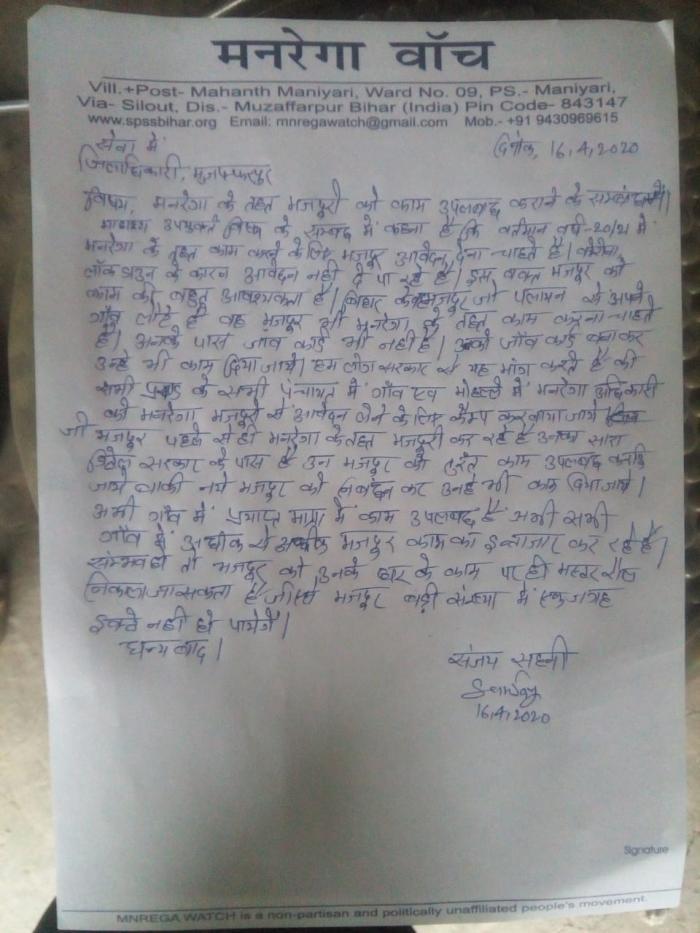In Bihar, Jobless, Penniless MGNREGA Workers hit Hard by Pandemic Lockdown
File Photo.
The occurrence of COVID-19 pandemic and the sudden lockdown since March 24 midnight in India has caused massive reverse migration of distressed workers into rural areas. The unemployment blow has badly hit the working class,as well as reduced MGNREGA workers to destitution.
Immediately after first phase of the nationwide lockdown (March 24), states had to shut down the rural job guarantee scheme. However, to rescue the economy, especially in rural areas, from the pandemic’s impact, the Central government decided to ease the lockdown rules from April 20.
The Mahatma Gandhi National Rural Employment Guarantee Act (MGNREGA) scheme in Bihar has been in coma in midst of the lockdown. Lakhs of MGNREGA workers are, therefore, reeling under financial distress as well as scarcity of food. With such a huge crisislooming over the country, providing relief to full-time rural scheme workers and those who have returned to the state remain the need of the hour.Despite relaxation of rules for the agricultural sector, construction works, etc., the rural population is pinning high hopes on commencement of MGNREGA projects.
As per Bihar government data, a total of 79,402 workers in Bihar got employed under MGNREGA scheme in 2020-21, among which 940 were employed in Muzaffarpur, 4,726 in East Champaran, 2,069 in Araria, 1,817 in Patna, 572 in Arwal, 994 in Gaya, etc.
The government figures given above are sure to witness a massive rise as the distressed migrant workforce that has returned home will join the existing ones, but the oft-repeated norm of non-payment of wages is likely to continue,claim many workers who have been surviving on the existing rural employment scheme.
Speaking with NewsClick over phone, Ajay Sahni of Muzaffarpur,said that during the lockdown period, his wife did not receive the previous pending wage of 30 days and there are at least 500 such workers ofKurhani block who are facing the same crisis. Besides this, no extra relief in the form of cash has reached any of them. Taking help from local mahajan(moneylender) is the only option, he added.
Renu Devi, 39, another MGNREGA worker said since long their wage was pending but the lockdown due to coronavirus had added to their miseries. “There is talk of resuming MGNREGA work but we haven’t sought work from Rozgaar Sevak (the state government deputed panchayat official) due to movement restrictions. We are in dire need of financial assistance and hope the government heeds us,” she added.
The MGNREGA wage in Bihar is Rs 177/day but the minimum wage for unskilled workers in the state remains at Rs 287/day.
Sanjay Sahni, a Muzaffarpur-based social activist who fights for the rights of MGNREGA workers,raised concerns over the way workers were being treated in the state, with no extra compensation or payment of previous wages and no declaration of work. To seek details of the job to be done is preceded by the rule of demanding work, which did not happen due to the strict lockdown.
Workers from the hinterland did not get the opportunity to demand work,by then restarting rural work from April 20 was announced, he added.
Sahnifeared that officials might play foul after rural work starts by providing jobs to only a handful of workers, while showing the numerical strength on paper. The Mahant Maniyari panchayat of
Kurhani block alone has 2,500 MNREGA job card holders, who are unlikely to get any opportunity to work.
The social activist said the declaration of easing lockdown rules may not necessarily benefit MGNREGA workers. In a letter to the Muzaffarpur District Magistrate, Sahnihas appealed to him to organise a camp where officials can receive applications of workers seeking work, so that jobs can be provided on immediate basis to workers whose details are already with panchayat officials. The workers should be assigned work near their houses to maintain physical distance, he added.

Letter to Muzaffarpur DM seeking employment under MNREGA
As per news inputs of Hindi newspaper,Dainik Bhaskar, on March 17, contrary to the concerns of activists and workers, the Bihar government claimed that most of the MGNREGA work in the state had got approval. According to the state rural development department, full-fledged MGNREGA works in total 8,386 panchayats, involving Pradhan Mantri Awas Yojna, renovation of small ponds, jal-jeevan-hariyali had resumed. More than 25,000 workers have been invited to join and panchayat officials have been asked to rope in the maximum number of work force statewide.
Araria-based Ashish Ranjan, National Convenor of National Alliance of People’s Movement,had similar concerns about MGNREGA workers.He said the hardship of these workers had increased during lockdown and they were relying either on the previous year’s buffer stock of grains or supply of rations under the public distribution system or were seeking help from social networks, as there is no availability of cash which they used to earn on a daily basis.
MGNREGA is a scheme where people earn a dignified livelihood through physical hard work. But, after the lockdown, the scheme’s smooth run seems unlikely due to the doubtful intention of the government. The plan to provide work, attendance, measurement of work done and, lastly, wage payment are necessary steps,which do not seem easy if one goes by the announcement made recently.
Moreover, since the Management Information System (MIS) of MGNREGA contains details of all job cards, muster rolls, wage and material payments, activists fear that officials could manipulate the online system to influence the programme in insidious ways.
In last week of March, the Central government claimed to have released Rs. 4,431 crore to clear the previous pending wages under rural job scheme,after protests and demands by social activists, such as Aruna Roy and Nikhil Dey, who petitioned the Supreme Court of India, requesting payment of MGNREGA wages to workers. In the petition, they pleaded for:
- Full payment to all active MGNREGA registered households for entire duration of lockdown period starting from March 23,
- Issuance of individual temporary job cards within 15 days to all migrants who have returned from cities to their native villages,
- And work entitlement of households from 100 days to 200 days per household to support rural livelihoods.
The Central and the state government sare the largest employers of the MGNREGS through which millions in distress can be served, but there has been non-payment of wages for the period of March 24 till April 20, when the scheme was not exempted from the lockdown,the extension of 100 days’ work to 200 days was not done, neither were wages raised. However, according to Section 3(3) of the MGNREGA, workers are entitled to payment on a weekly basis, and in any case, within a fortnight of the date on which work was done.
The National Rural Employment Guarantee Act, 2005, states that in case of a delay in payments, there is a provision for compensation to workers at the rate of 0.05% per day.Will the government follow this legal obligation and deliver? Millions of distressed MGNREGA workers are banking on hope.
Read Also: Bihar’s MGNREGA Workers Stare at Deeper Rural Stagnation
The writer is an independent researcher and journalist based in Bihar. The views are personal.
Get the latest reports & analysis with people's perspective on Protests, movements & deep analytical videos, discussions of the current affairs in your Telegram app. Subscribe to NewsClick's Telegram channel & get Real-Time updates on stories, as they get published on our website.
























